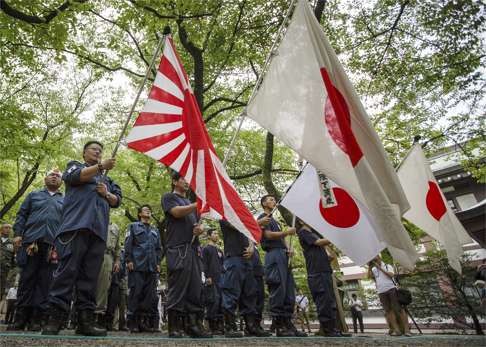
Japan PM Abe sends ritual offering to controversial Yasukuni shrine on anniversary of second world war defeat
Prime Minister Shinzo Abe sent a ritual offering to a shrine for war dead on Monday, the anniversary of Japan’s second world war defeat, but did not visit the shrine, which is seen in China and South Korea as a symbol of Tokyo’s wartime militarism.
Visits to Yasukuni Shrine by top Japanese politicians outrage China and South Korea because it honours 14 Japanese leaders convicted as war criminals by an Allied tribunal, along with war dead.
Ties between China and Japan, Asia’s two largest economies, were strained in recent days after a growing number of Chinese coastguard and other government ships sailed near disputed islets in the East China Sea.


Abe has not visited the shrine in person since December 2013, but has instead sent ritual offerings.
“He told me to come and my visit was out of respect to those who gave their lives for the country,” said Yasutoshi Nishimura, an aide in Abe’s Liberal Democratic Party (LDP), who gave the offering in Abe’s name as LDP president rather than premier.

Emperor Akihito, speaking at a ceremony honouring victims of the war, expressed “deep remorse” over the conflict fought in the name of his father, Hirohito. He first used the phrase at the memorial service last year on the 70th anniversary of the war’s end. Some saw it as a subtle rebuke to the conservative Abe, who favours a less apologetic tone.
In Nanjing, China, Chinese and South Korea representatives gathered at a memorial hall for victims of Japan’s notorious 1937 Nanking massacre to commemorate victory in what China calls the War of Resistance Against Japanese Aggression.
China, which was partially occupied by Japan from the early 1930s to 1945, marks the end of the war on September 3.

Abe reiterated his pledge not to let the tragedy of war be repeated, but he neither mentioned Japan’s wartime actions in Asia nor apologised to its victims.

“Going forward, and sticking to this firm pledge while facing history with humility, we will make every effort to contribute to world peace and prosperity and the realisation of a world where everyone can live without fear,” he said.
Among the roughly 70 lawmakers who visited Yasukuni Shrine were Olympics Minister Tamayo Marukawa and Shinjiro Koizumi, the son of popular prime minister Junichiro Koizumi, himself often tipped as a future premier.

Chief Cabinet Secretary Yoshihide Suga declined to comment on the visits, saying it was a private matter for each individual.
The row over the islets is one of a number of bitter disputes that have tainted relations between Seoul and Tokyo for decades.

Seoul’s foreign ministry said that it expresses deep worry and regret over leaders from the Japanese government and parliament repeatedly paying homage to Yasukuni Shrine.
Abe’s likely decision not to visit the shrine on Monday comes as the government is making arrangements for talks between him and President Xi Jinping on the fringes of a Group of 20 gathering to be held in China next month.
In talks with his Japanese counterpart Fumio Kishida last month in Laos, Chinese Foreign Minister Wang Yi demanded that Japan be careful of what it says about South China Sea matters, in a call for Japan not to interfere. Japan is not directly involved in the overlapping territorial claims in this sea pitting China against some Southeast Asian countries.
Additional reporting by Kyodo

